#data security challenges
Explore tagged Tumblr posts
Text

Fortanix offers secure, scalable, and vaultless data tokenization, ensuring PII, financial, and healthcare data stay safe. Comply with GDPR, HIPAA, and PCI DSS while enabling secure data sharing across applications and AI models.
#encryption#data security#data privacy#fortanix#cloud security#cyber security#data security challenges#key management#data privacy challenges#blockchain#data safety#secure data
0 notes
Text
Starting to think computers are actually the work of a dark and twisted demonic force.
#trying to trouble shoot a pc problem and we've gotten to the point wherein i am considering just ignoring it and hoping it solves itself orz#everything i try just makes things worse!!#i cleared my site data instead of just the temporary files in firefox and now nothing loads so im restarting the damn pc#but its taking. FOREVER. which is always a great sign. if this doesn't fix the page load times (not even the original problem!) im going to#freak out. just completely. because now i have to fix two things tomorrow... i wanna go to bed i don't want to do tech support anymore#im just frustrated and doing things impulsively that are not very helpful. so now i have to sadly sign back into every website on earth#which is very slow and painful because SOMEONE is hogging all my disk#everyone stop hogging all my disk and let firefox load challenge difficulty level impossible#but hey. restarting it did make the pages actually load now. i started this post on my phone and am now editing it on my working pc -w-)b#i am going to have 500 security alerts in my inbox tomorrow lol.#snow blogging
16 notes
·
View notes
Text
At the California Institute of the Arts, it all started with a videoconference between the registrar’s office and a nonprofit.
One of the nonprofit’s representatives had enabled an AI note-taking tool from Read AI. At the end of the meeting, it emailed a summary to all attendees, said Allan Chen, the institute’s chief technology officer. They could have a copy of the notes, if they wanted — they just needed to create their own account.
Next thing Chen knew, Read AI’s bot had popped up inabout a dozen of his meetings over a one-week span. It was in one-on-one check-ins. Project meetings. “Everything.”
The spread “was very aggressive,” recalled Chen, who also serves as vice president for institute technology. And it “took us by surprise.”
The scenariounderscores a growing challenge for colleges: Tech adoption and experimentation among students, faculty, and staff — especially as it pertains to AI — are outpacing institutions’ governance of these technologies and may even violate their data-privacy and security policies.
That has been the case with note-taking tools from companies including Read AI, Otter.ai, and Fireflies.ai.They can integrate with platforms like Zoom, Google Meet, and Microsoft Teamsto provide live transcriptions, meeting summaries, audio and video recordings, and other services.
Higher-ed interest in these products isn’t surprising.For those bogged down with virtual rendezvouses, a tool that can ingest long, winding conversations and spit outkey takeaways and action items is alluring. These services can also aid people with disabilities, including those who are deaf.
But the tools can quickly propagate unchecked across a university. They can auto-join any virtual meetings on a user’s calendar — even if that person is not in attendance. And that’s a concern, administrators say, if it means third-party productsthat an institution hasn’t reviewedmay be capturing and analyzing personal information, proprietary material, or confidential communications.
“What keeps me up at night is the ability for individual users to do things that are very powerful, but they don’t realize what they’re doing,” Chen said. “You may not realize you’re opening a can of worms.“
The Chronicle documented both individual and universitywide instances of this trend. At Tidewater Community College, in Virginia, Heather Brown, an instructional designer, unwittingly gave Otter.ai’s tool access to her calendar, and it joined a Faculty Senate meeting she didn’t end up attending. “One of our [associate vice presidents] reached out to inform me,” she wrote in a message. “I was mortified!”
24K notes
·
View notes
Text

An overview of the key challenges facing modern cloud storage solutions—security risks, scalability limitations, high costs, and poor collaboration—highlighted by eShare.ai.
#cloud storage problems#cloud storage issues#eShare.ai#cloud storage security#cloud platform challenges#storage scalability#data collaboration issues#cloud cost concerns#cloud technology limitations#file sharing problems
0 notes
Text
I haven’t really seen any of the more recent U.S. election news hitting tumblr yet so here’s some updates (now edited with sources added):
There’s evidence of Trump cheating and interfering with the election.
Possible Russian interference.
Mail-in ballots are not being counted or “recognized” in multiple (notably swing) states.
30+ bomb threats were called in and shut down polling stations on Election Day.
20+ million votes are still unaccounted for, and that’s just to have the same voter turnout as 2020.
There was record voter turnout and new/first-time voter registration this year. We definitely should be well over the turnout in 2020.
U.S. citizens are using this site to demand, not only a recount, but a complete investigation into election fraud and interference for the reasons stated above:
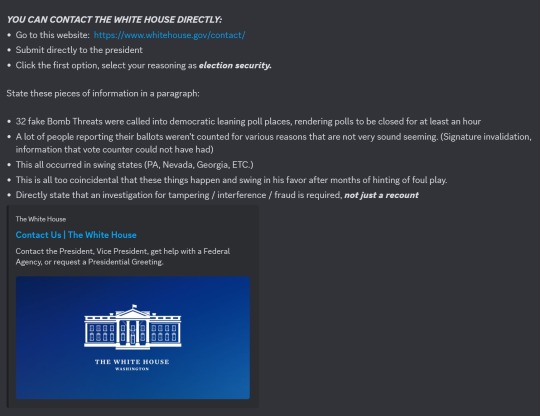
Here is what I submitted as an example:
An investigation for election interference and fraud is required. We desperately need a recount or even a revote. The American people deserve the right to a free and fair election. There has been evidence unveiled of Trump cheating and committing election fraud which is illegal. There is some evidence of possible Russian interference. At least 30+ bomb threats were called in to polling places. Multiple, notably swing states, have ballots unaccounted for and voting machines not registering votes. Ballots and ballot boxes were tampered with and burned. Over 20 million votes that we know of are unaccounted for. With record turnout and new voter registration this year, there should be no possibility that there are less votes than even in the 2020 election.
Sources (working on finding more links but if anyone wants to add info, it’s appreciated):
FBI addressing Russian interference and bomb threats:
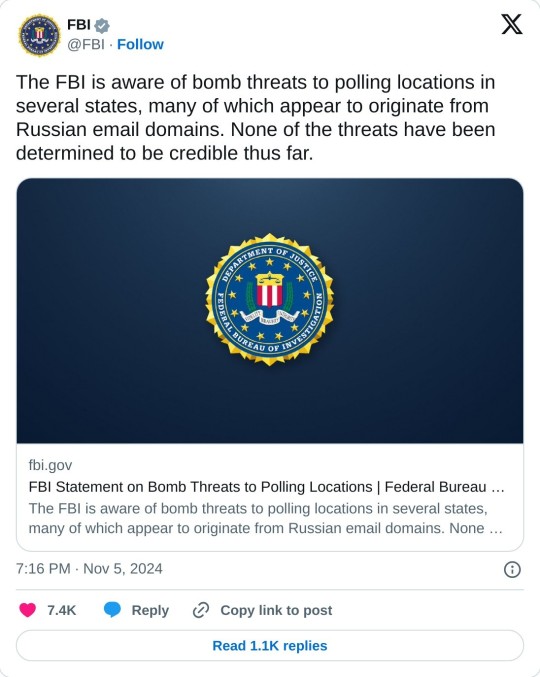
Emails released by Rachael Bellis (private account, can’t share original tweet) confirming Trump committing election fraud:
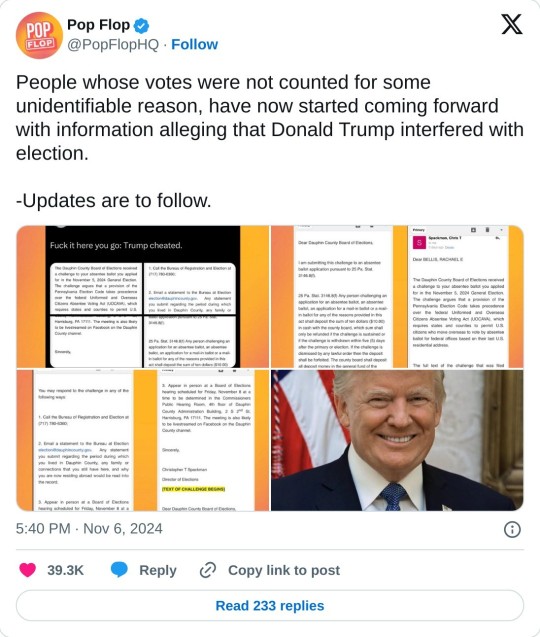
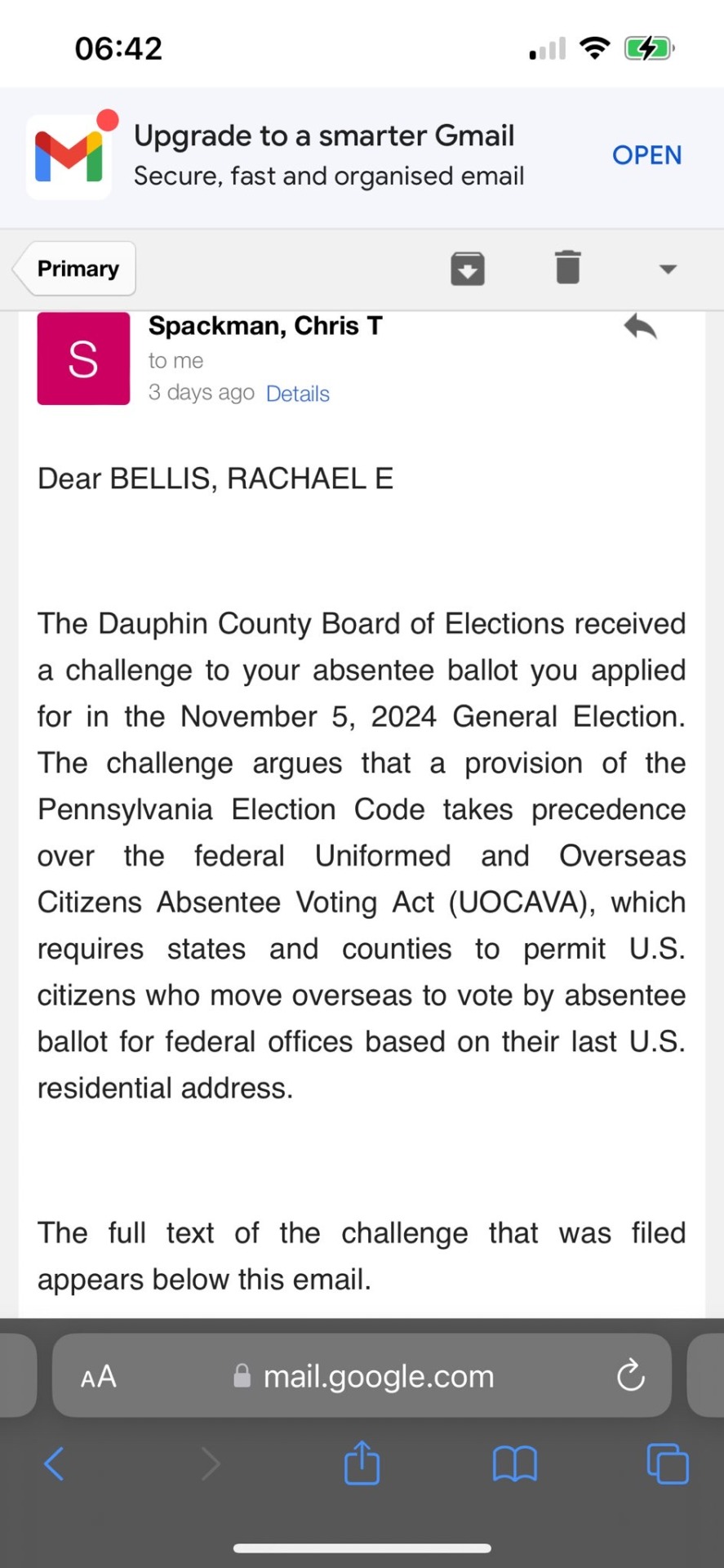
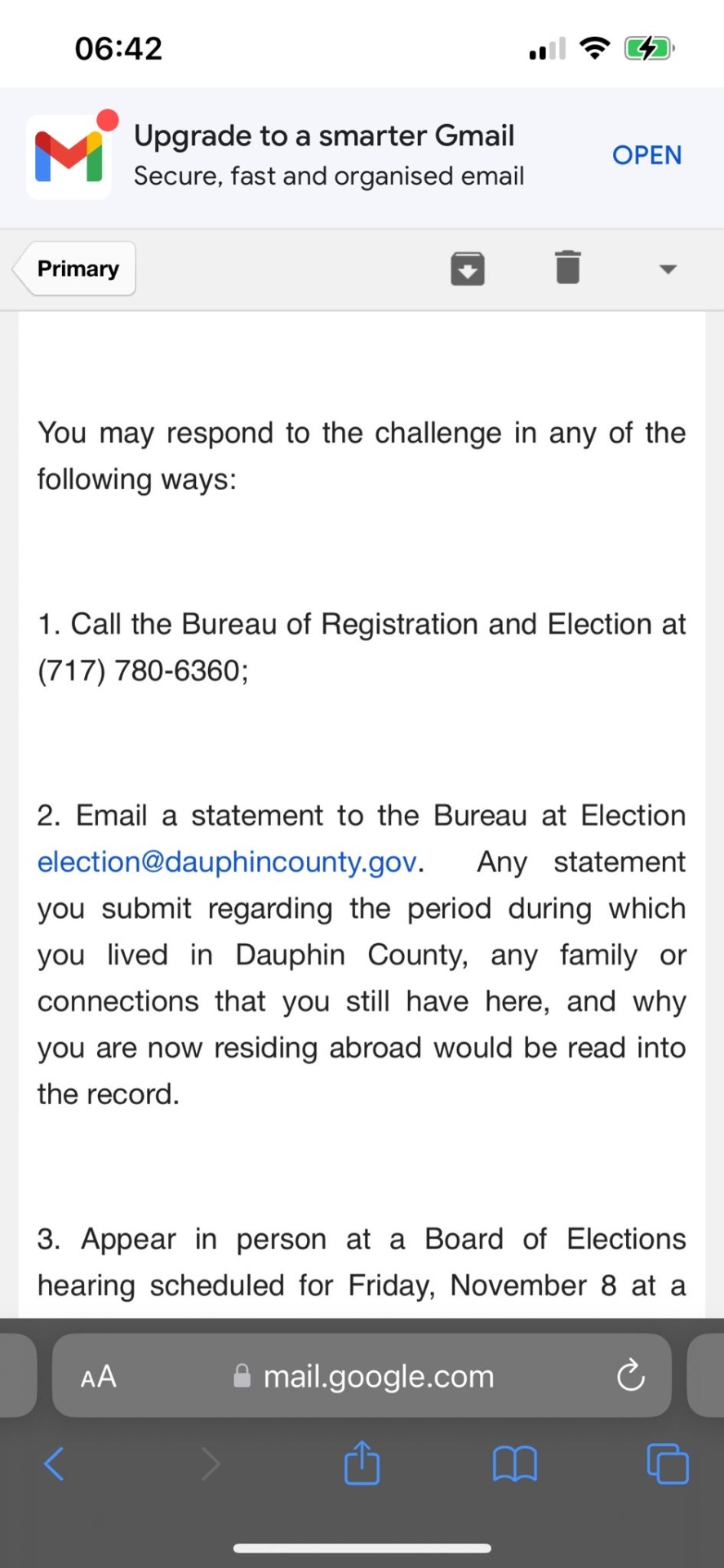
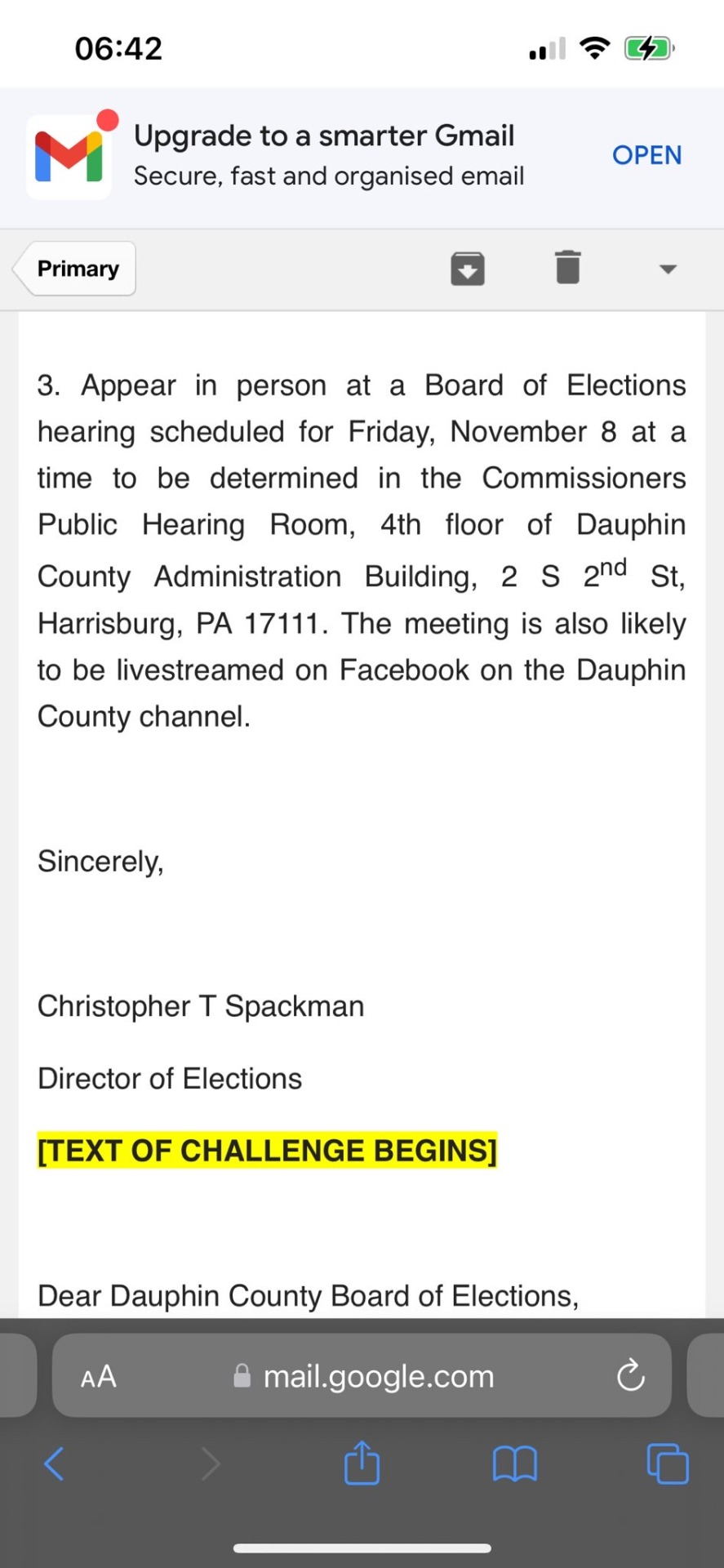
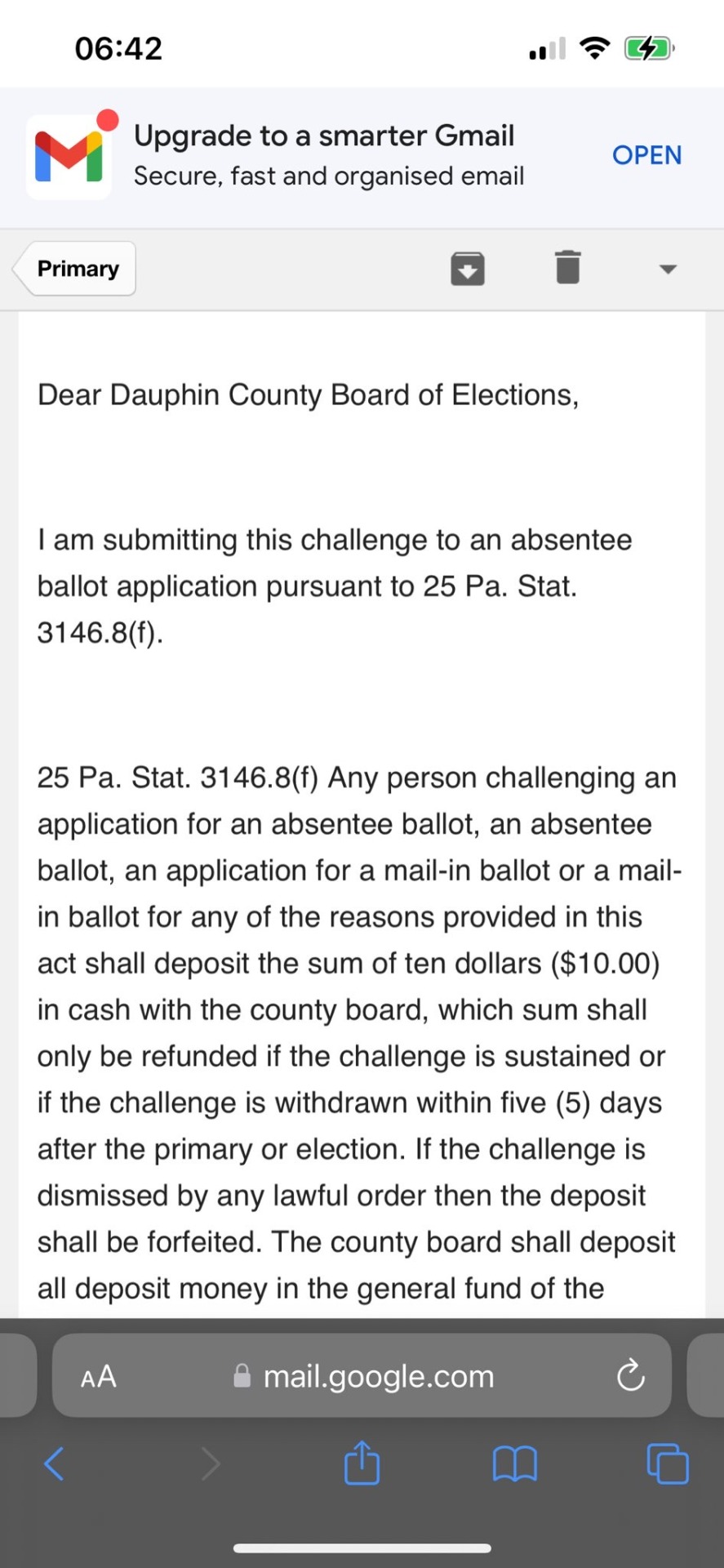
Pennsylvania's Centre County officials say they are working with their ballot scanner vendor to figure out why the county's mail-in ballot data is "not being recognized when uploaded to the elections software:”
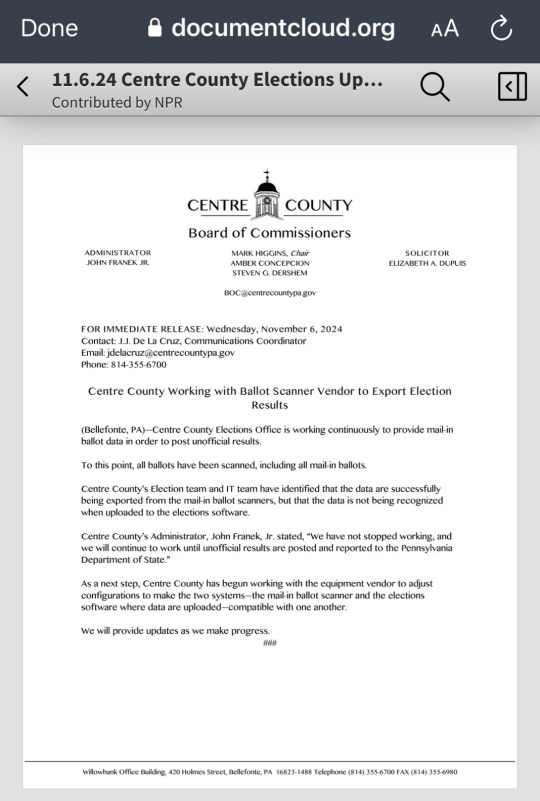
Wisconsin recount:
[ID:
Multiple screenshots and images.
The first is a screenshot with a link and information for contacting the White House directly regarding election fraud. The instructions include choosing to leave a comment to President Joe Biden directly and to select election security as the reason.
The screenshot then instructs people to include any or all of the following information in a paragraph as a comment to the president:
32 fake bomb threats were called into Democratic leaning poll places, rendering polling places closed for at least an hour.
A lot of people reporting their ballots were not counted for various reasons.
This all occurred in swing states.
This is too coincidental that these things happen and swing in his favor after months of hinting at foul play.
Directly state that an investigation for tampering, interference, fraud is required, not just a recount.
The second image is from the FBI Twitter account that reads:
The FBI is aware of bomb threats to polling locations in several states, many of which appear to originate from Russian email domains. None of the threats have been determined to be credible thus far. https://t.co/j3YfajVK1m — FBI (@FBI) November 5, 2024
The next four Gmail screenshots of an email sent to Rachael Bellis from Chris T. Spackman that read together as follows:
Dear BELLIS, RACHAEL E., The Dauphin County Board of Elections received a challenge to your absentee ballot you applied for in the November 5, 2024 General Election. The challenge argues that a provision of the Pennsylvania Election Code takes precedence over the federal Uniformed and Overseas Citizens Absentee Voting Act (UOCAVA), which requires states and counties to permit U.S. citizens who move overseas to vote by absentee ballot for federal offices based on their last U.S. residential address.
The full text of the challenge that was filed appears below this email.
You may respond to the challenge in any of the following ways:
1. Call the Bureau of Registration and Election at (717) 780-6360;
2. Email a statement to the Bureau at Election [email protected]. Any statement you submit regarding the period during which you lived in Dauphin County, any family or connections that you still have here, and why you are now residing abroad would be read into the record.
3. Appear in person at a Board of Elections hearing scheduled for Friday, November 8 at a time to be determined in the Commissioners Public Hearing Room, 4th floor of Dauphin County Administration Building, 2 S 20d St, Harrisburg, PA 17111. The meeting is also likely to be livestreamed on Facebook on the Dauphin County channel.
Sincerely,
Christopher T Spackman
TEXT OF CHALLENGE BEGINS
Dear Dauphin County Board of Elections,
I am submitting this challenge to an absentee ballot application pursuant to 25 Pa. Stat.
3146.8(f).
25 Pa. Stat. 3146.8(f) Any person challenging an application for an absentee ballot, an absentee ballot, an application for a mail-in ballot or a mail-in ballot for any of the reasons provided in this act shall deposit the sum of ten dollars ($10.00) in cash with the county board, which sum shall only be refunded if the challenge is sustained or if the challenge is withdrawn within five (5) days after the primary or election. If the challenge is dismissed by any lawful order then the deposit shall be forfeited. The county board shall deposit all deposit money in the general fund of the…
The rest of the forwarded email is cut off.
The last image is a screenshot of the official statement from the Centre County, Pennsylvania Board of Commissioners released on November 6, 2024 that states:
Centre County Working with Ballot Scanner Vendor to Export Election Results.
(Bellefonte, PA) -Centre County Elections Office is working continuously to provide mail-in ballot data in order to post unofficial results.
To this point, all ballots have been scanned, including all mail-in ballots.
Centre County's Election team and IT team have identified that the data are successfully being exported from the mail-in ballot scanners, but that the data is not being recognized when uploaded to the elections software.
Centre County's Administrator, John Franek, Jr. stated, "We have not stopped working, and we will continue to work until unofficial results are posted and reported to the Pennsylvania Department of State."
As a next step, Centre County has begun working with the equipment vendor to adjust configurations to make the two systems-the mail-in ballot scanner and the elections software where data are uploaded -compatible with one another.
We will provide updates as we make progress.
/end ID]
#sources added#us politics#us election#presidential election#2024 presidential election#election interference#election integrity#election security#image described#image description in alt#image description included#image description added#described#kamala harris#kamala 2024#us news#us presidents#updated id
36K notes
·
View notes
Text
Challenges in AI Development & Deployment

Artificial Intelligence (AI) has transformed industries, driving automation, efficiency, and decision-making. However, despite its advancements, AI development and deployment come with significant challenges that slow down adoption and raise ethical concerns. From data biases and regulatory compliance to computational limitations, businesses and governments must address these hurdles to fully unlock AI’s potential.
For expert insights on why AI alone won’t shape the future, check out this analysis.
Key Challenges in AI Development
1. Data Quality and Bias Issues
AI models rely on large datasets, but poor-quality or biased data can lead to unfair and inaccurate results.
Bias in AI has been seen in hiring processes, credit scoring, and facial recognition systems, raising ethical concerns.
Ensuring data diversity and unbiased training is crucial for AI fairness and effectiveness.
2. High Costs & Computational Power Requirements
Developing AI models requires expensive hardware, cloud computing, and energy-intensive resources.
Training complex AI systems consumes vast amounts of electricity and computing power, making it less sustainable.
Startups and smaller businesses struggle with AI deployment due to high operational costs.
3. Regulatory & Compliance Challenges
Governments worldwide are introducing AI regulations to prevent unethical AI usage and ensure transparency.
GDPR, the EU AI Act, and UK AI governance policies are reshaping how businesses deploy AI.
Companies must comply with privacy laws, data protection frameworks, and ethical AI guidelines.
Challenges in AI Deployment
1. Lack of General Intelligence & Adaptability
AI remains task-specific, meaning it can only perform within its pre-defined scope.
Unlike Artificial General Intelligence (AGI), today’s AI lacks human-like reasoning and adaptability.
AI models struggle with real-world unpredictability, limiting their broader applications.
2. Cybersecurity Risks & Ethical Dilemmas
AI is vulnerable to cyber threats, data breaches, and adversarial attacks.
Malicious actors can manipulate AI models, leading to misinformation and fraudulent activities.
Governments must strengthen AI security frameworks to protect sensitive information.
3. Public Trust & Workforce Disruption
Job displacement fears due to AI automation create resistance in workplaces.
Public distrust in AI-driven decisions raises concerns about transparency and accountability.
Businesses need AI ethics policies and human-AI collaboration models to gain societal acceptance.
How to Overcome AI Challenges
1. Ethical AI Development & Responsible Deployment
AI developers must prioritize fairness, transparency, and unbiased data selection.
Investing in AI ethics research and regulatory compliance will improve public trust.
Companies should adopt explainable AI (XAI) models to enhance accountability.
2. Advancing AI Infrastructure & Computing Power
Businesses should leverage cloud-based AI solutions and quantum computing advancements.
Reducing computational costs through optimization techniques will make AI adoption more accessible.
Governments and private sectors must invest in AI supercomputing centers to support future innovations.
3. Strengthening AI Governance & Cybersecurity
AI security frameworks should integrate strong encryption, data privacy safeguards, and cyber threat detection.
AI developers must collaborate with policymakers to shape ethical AI regulations.
Enhancing AI explainability and accountability will drive responsible AI adoption.
Tej Kohli’s Perspective on AI Challenges & Future Growth
Investor and tech entrepreneur Tej Kohli has emphasized that while AI holds transformative potential, overcoming its challenges is critical. His insights include:
AI alone is not the future—technologies like Artificial General Intelligence (AGI) and quantum computing will drive real innovation.
Investments in AI ethics and security are essential to prevent AI misuse and biases.
Businesses and governments must work together to develop AI policies that encourage both innovation and accountability.
Conclusion
AI development and deployment come with major hurdles, from data biases and cybersecurity risks to high costs and regulatory challenges. Overcoming these issues requires a collaborative effort from governments, businesses, and AI researchers. By focusing on ethical AI practices, improved computing power, and stronger governance, AI can evolve into a trustworthy and transformative force.
#Artificial Intelligence#Tej Kohli#AI Challenges#Ethical AI#AI Regulation#Machine Learning#Future of AI#Quantum Computing#AI Security#Data Privacy
0 notes
Text
Correcting a Chinese kid's English homework that another American got wrong on a Chinese app named after Mao Zedong's Little Red Book as part of a mass online temper tantrum to help save TikTok was not on my 2025 bingo card, but here we are.
This might actually be the political fuck-up of the century. Our politicians are all 900 year old crypt keepers who probably turn off their computers by unplugging them from the wall. Were there a single synapse in their decrepit domes focused on something besides their next payday, they might have thought twice about challenging Millennials and Zoomers on the internet. I repeat, ON THE INTERNET. Oh to have the confidence of an octogenarian born into generational wealth.
Something I need people to understand is the "security threat" doesn't just stop at data. The mere act of normal Chinese and American citizens interacting scares the shit out of governments on both sides. I'm already seeing videos from folks here in the US talking about how shocked they were at the grocery hauls in China, and how much they could get with very little. Chinese people are watching Americans absolutely dog walk their own government and talk it for filth. People are having fun.
All rich people had to do was remember the deal. Americans are terrible people. If they had just paid folks enough to buy a house, an electric car, and a vacation once a year they'd sit in front of the TV in a docile fugue state while the wealthy shoved their boots up the ass of the global south. Now who knows what's going to happen. I just know it's a testament to how done with Mark Zuckerberg's ass people are that they're rather learn Mandarin than go back to Facebook.
I think 2025 is about to be a ride.
21K notes
·
View notes
Text
At M.Kumarasamy College of Engineering (MKCE), we emphasize the significance of engineering ethics in shaping responsible engineers. Engineering ethics guide decision-making, foster professionalism, and ensure societal welfare. Our curriculum integrates these principles, teaching students to consider the long-term impacts of their work. Students are trained in truthfulness, transparency, and ethical communication, while also prioritizing public safety and environmental sustainability. We focus on risk management and encourage innovation in sustainable technologies. Our programs also address contemporary challenges like artificial intelligence and cybersecurity, preparing students to tackle these with ethical responsibility. MKCE nurtures future engineers who lead with integrity and contribute to society’s well-being.
To know more : https://mkce.ac.in/blog/engineering-ethics-and-navigating-the-challenges-of-modern-technologies/
#mkce college#top 10 colleges in tn#engineering college in karur#best engineering college in karur#private college#libary#mkce#best engineering college#mkce.ac.in#engineering college#• Engineering Ethics#Engineering Decision Making#AI and Ethics#Cybersecurity Ethics#Public Safety in Engineering#• Environmental Sustainability in Engineering#Professional Responsibility#Risk Management in Engineering#Artificial Intelligence Challenges#Engineering Leadership#• Data Privacy and Security#Ethical Engineering Practices#Sustainable Engineering Solutions#• Technological Innovation and Ethics#Technological Innovation and Ethics#MKCE Engineering Curriculum#• Social Responsibility in Engineering#• Engineering Ethics in AI#Workplace Ethics in Engineering#Collaboration in Engineering Projects
0 notes
Text

"The HSM is Dead. Long Live Modern Hardware Security!" From legacy tech to cloud-native security solutions, see how modern HSMs are reshaping data protection. Discover Fortanix's approach to secure your future.
#encryption#cloud security#data privacy challenges#data security#data privacy#data security challenges#key management#fortanix#blockchain#cyber security
0 notes
Text
Sam Altman, OpenAI: The superintelligence era has begun
New Post has been published on https://thedigitalinsider.com/sam-altman-openai-the-superintelligence-era-has-begun/
Sam Altman, OpenAI: The superintelligence era has begun
OpenAI chief Sam Altman has declared that humanity has crossed into the era of artificial superintelligence—and there’s no turning back.
“We are past the event horizon; the takeoff has started,” Altman states. “Humanity is close to building digital superintelligence, and at least so far it’s much less weird than it seems like it should be.”
The lack of visible signs – robots aren’t yet wandering our high streets, disease remains unconquered – masks what Altman characterises as a profound transformation already underway. Behind closed doors at tech firms like his own, systems are emerging that can outmatch general human intellect.
“In some big sense, ChatGPT is already more powerful than any human who has ever lived,” Altman claims, noting that “hundreds of millions of people rely on it every day and for increasingly important tasks.”
This casual observation hints at a troubling reality: such systems already wield enormous influence, with even minor flaws potentially causing widespread harm when multiplied across their vast user base.
The road to superintelligence
Altman outlines a timeline towards superintelligence that might leave many readers checking their calendars.
By next year, he expects “the arrival of agents that can do real cognitive work,” fundamentally transforming software development. The following year could bring “systems that can figure out novel insights”—meaning AI that generates original discoveries rather than merely processing existing knowledge. By 2027, we might see “robots that can do tasks in the real world.”
Each prediction seems to leap beyond the previous one in capability, drawing a line that points unmistakably toward superintelligence—systems whose intellectual capacity vastly outstrips human potential across most domains.
“We do not know how far beyond human-level intelligence we can go, but we are about to find out,” Altman states.
This progression has sparked fierce debate among experts, with some arguing these capabilities remain decades away. Yet Altman’s timeline suggests OpenAI has internal evidence for this accelerated path that isn’t yet public knowledge.
A feedback loop that changes everything
What makes current AI development uniquely concerning is what Altman calls a “larval version of recursive self-improvement”—the ability of today’s AI to help researchers build tomorrow’s more capable systems.
“Advanced AI is interesting for many reasons, but perhaps nothing is quite as significant as the fact that we can use it to do faster AI research,” he explains. “If we can do a decade’s worth of research in a year, or a month, then the rate of progress will obviously be quite different.”
This acceleration compounds as multiple feedback loops intersect. Economic value drives infrastructure development, which enables more powerful systems, which generate more economic value. Meanwhile, the creation of physical robots capable of manufacturing more robots could create another explosive cycle of growth.
“The rate of new wonders being achieved will be immense,” Altman predicts. “It’s hard to even imagine today what we will have discovered by 2035; maybe we will go from solving high-energy physics one year to beginning space colonisation the next year.”
Such statements would sound like hyperbole from almost anyone else. Coming from the man overseeing some of the most advanced AI systems on the planet, they demand at least some consideration.
Living alongside superintelligence
Despite the potential impact, Altman believes many aspects of human life will retain their familiar contours. People will still form meaningful relationships, create art, and enjoy simple pleasures.
But beneath these constants, society faces profound disruption. “Whole classes of jobs” will disappear—potentially at a pace that outstrips our ability to create new roles or retrain workers. The silver lining, according to Altman, is that “the world will be getting so much richer so quickly that we’ll be able to seriously entertain new policy ideas we never could before.”
For those struggling to imagine this future, Altman offers a thought experiment: “A subsistence farmer from a thousand years ago would look at what many of us do and say we have fake jobs, and think that we are just playing games to entertain ourselves since we have plenty of food and unimaginable luxuries.”
Our descendants may view our most prestigious professions with similar bemusement.
The alignment problem
Amid these predictions, Altman identifies a challenge that keeps AI safety researchers awake at night: ensuring superintelligent systems remain aligned with human values and intentions.
Altman states the need to solve “the alignment problem, meaning that we can robustly guarantee that we get AI systems to learn and act towards what we collectively really want over the long-term”. He contrasts this with social media algorithms that maximise engagement by exploiting psychological vulnerabilities.
This isn’t merely a technical issue but an existential one. If superintelligence emerges without robust alignment, the consequences could be devastating. Yet defining “what we collectively really want” will be almost impossible in a diverse global society with competing values and interests.
“The sooner the world can start a conversation about what these broad bounds are and how we define collective alignment, the better,” Altman urges.
OpenAI is building a global brain
Altman has repeatedly characterised what OpenAI is building as “a brain for the world.”
This isn’t meant metaphorically. OpenAI and its competitors are creating cognitive systems intended to integrate into every aspect of human civilisation—systems that, by Altman’s own admission, will exceed human capabilities across domains.
“Intelligence too cheap to meter is well within grasp,” Altman states, suggesting that superintelligent capabilities will eventually become as ubiquitous and affordable as electricity.
For those dismissing such claims as science fiction, Altman offers a reminder that merely a few years ago, today’s AI capabilities seemed equally implausible: “If we told you back in 2020 we were going to be where we are today, it probably sounded more crazy than our current predictions about 2030.”
As the AI industry continues its march toward superintelligence, Altman’s closing wish – “May we scale smoothly, exponentially, and uneventfully through superintelligence” – sounds less like a prediction and more like a prayer.
While timelines may (and will) be disputed, the OpenAI chief makes clear the race toward superintelligence isn’t coming—it’s already here. Humanity must grapple with what that means.
See also: Magistral: Mistral AI challenges big tech with reasoning model
Want to learn more about AI and big data from industry leaders? Check out AI & Big Data Expo taking place in Amsterdam, California, and London. The comprehensive event is co-located with other leading events including Intelligent Automation Conference, BlockX, Digital Transformation Week, and Cyber Security & Cloud Expo.
Explore other upcoming enterprise technology events and webinars powered by TechForge here.
#agents#AGI#ai#ai & big data expo#AI development#AI industry#AI research#ai safety#AI systems#Algorithms#amp#Art#artificial#Artificial Intelligence#automation#Big Data#BIG TECH#Brain#Building#california#challenge#chatGPT#classes#Cloud#Collective#Companies#comprehensive#conference#cyber#cyber security
0 notes
Text
AI and Health: New Technologies Paving the Way for Better Treatment
Artificial intelligence (AI) is expanding rapidly in the health sector, and it is revolutionizing our medical system. With the help of AI, new technologies are being developed that are not only helpful in accurately diagnosing diseases but are also playing an important role in personalized treatment and management.

Quick and accurate diagnosis of diseases AI-based tools can now analyze medical imaging data such as X-rays, CT scans, and MRIs quickly and accurately. This helps doctors to quickly detect complex conditions such as cancer, heart diseases, and neurological problems.
Personalized medicine AI can help create personalized treatment plans for every individual by analyzing genomics and biometrics. This technology ensures that the patient gets the right medicine and the right dose at the right time.
Improved health management AI-based health apps and wearables such as smart watches are now helping people monitor their health condition. These devices regularly track health indicators such as heart rate, blood pressure and sleep quality.
Accelerating medical research The role of AI has become extremely important in the development of new drugs and vaccines. Using AI, scientists can analyze complex data sets and make new medical discoveries faster.
Accessible and affordable healthcare AI technology is helping in delivering affordable and effective healthcare, even in rural and remote areas. Telemedicine and virtual health assistants are bridging the gap between patients and doctors.
Conclusion Artificial intelligence is playing an important role in making healthcare more effective, accurate, and accessible. However, there are challenges such as data security and ethics in the use of AI technology which need to be dealt with. In the coming years, with more advanced and innovative uses of AI, the healthcare landscape may change completely.
#AI and Health: New Technologies Paving the Way for Better Treatment#Artificial intelligence (AI) is expanding rapidly in the health sector#and it is revolutionizing our medical system. With the help of AI#new technologies are being developed that are not only helpful in accurately diagnosing diseases but are also playing an important role in#Quick and accurate diagnosis of diseases#AI-based tools can now analyze medical imaging data such as X-rays#CT scans#and MRIs quickly and accurately. This helps doctors to quickly detect complex conditions such as cancer#heart diseases#and neurological problems.Personalized medicine#AI can help create personalized treatment plans for every individual by analyzing genomics and biometrics. This technology ensures that the#AI-based health apps and wearables such as smart watches are now helping people monitor their health condition. These devices regularly tra#blood pressure and sleep quality.Accelerating medical research#The role of AI has become extremely important in the development of new drugs and vaccines. Using AI#scientists can analyze complex data sets and make new medical discoveries faster.Accessible and affordable healthcare#AI technology is helping in delivering affordable and effective healthcare#even in rural and remote areas. Telemedicine and virtual health assistants are bridging the gap between patients and doctors.#Conclusion#Artificial intelligence is playing an important role in making healthcare more effective#accurate#and accessible. However#there are challenges such as data security and ethics in the use of AI technology which need to be dealt with. In the coming years#with more advanced and innovative uses of AI#the healthcare landscape may change completely.
1 note
·
View note
Text
Why Kenya's Agritech Startups Struggle to Penetrate the Market Despite Strong Investment
Discover why Kenya’s agritech startups struggle with market penetration despite strong investment, and explore how regulatory challenges and fragmented services hinder growth in the sector. Kenya’s agritech industry faces hurdles beyond funding, including complex regulations and data security concerns. Learn how startups can overcome these challenges to scale and succeed. Uncover the key barriers…
#agricultural technology Kenya#agritech ecosystem#agritech innovation challenges#agritech investment Kenya#agritech market penetration#agritech partnerships#Agritech Startups#AI in farming#climate resilience farming#data privacy in agriculture#data security agritech.#digital agricultural transformation#digital farming tools#digital financial services for farmers#farmer adoption of technology#fragmented service providers#IoT in agritech#Kenya agritech challenges#Kenya’s digital ecosystem#Mercy Corps AgriFin#public sector data in agriculture#regulatory barriers agritech#small-scale farming Kenya#smart farming Kenya#stakeholder engagement in agritech#sustainable agriculture Kenya#tech solutions for farmers#technology adoption barriers#technology-driven agriculture
1 note
·
View note
Text
OT Security: The Achilles’Heel for Manufacturing.

In an era where digital transformation is reshaping industries, the manufacturing sector faces a unique set of cybersecurity challenges. As manufacturers increasingly integrate advanced technologies into their operations, the convergence of Operational Technology (OT) and Information Technology (IT) introduces both opportunities and vulnerabilities. This blend of legacy systems with modern innovations has made cybersecurity a critical concern, as the sector grapples with complex threats ranging from ransomware attacks to supply chain vulnerabilities.
ALSO READ MORE- https://apacnewsnetwork.com/2024/07/ot-security-the-achillesheel-for-manufacturing/
#A Critical Examination of OT Security Challenges#AGM-IT and CISO#Alok Shankar Pandey#Alok Shankar Pandey AGM-IT and CISO Dedicated Freight Corridor Corporation of India#Amarish Kumar Singh#Amarish Kumar Singh CISO Godrej#Apollo Tyres#Baidyanath Kumar Chief Data Protection Officer JK Lakshmi Cement#Boyce Manufacturing#CISO Godrej#cybersecurity leaders#Dedicated Freight Corridor Corporation of India#Head of Global Cybersecurity#IT systems#Mansi Thapar Head of Global Cybersecurity Apollo Tyres#Mansi Thaper#OT Security#Sanjay Sharma Head of IT Infrastructure and Cybersecurity Shram Pistons#Sudipto Biswas CISO Emami#The Achilles’Heel for Manufacturing#Top cybersecurity leaders#Top cybersecurity leaders India#Top cybersecurity leaders of India
0 notes
Text
#Digital Transformation Challenges#Change Management Strategies#Technology Integration#Data Security#Stakeholder Engagement
0 notes
Text
Beyond Change Healthcare
The continued onslaught of cybersecurity attacks which if anything are only getting worse have impacted the healthcare system in dramatic fashion with the payment network brought down by the attack on Change Healthcare. Healthcare under Cyber Attack I keep hoping that we all get better at combatting these attempts to breach our data and that overall vigilance rises as we become more wary of…

View On WordPress
#cyber attacks#cyber awareness#cyber defense#cyber hygiene#cyber resilience#cyber safety#cyber threats#CyberCrime#Cybersecurity#cybersecurity awareness#cybersecurity best practices#cybersecurity challenges#cybersecurity culture#cybersecurity education#cybersecurity measures#cybersecurity news#cybersecurity protocols#cybersecurity resources#cybersecurity risks#cybersecurity solutions#cybersecurity strategy#cybersecurity tips#cybersecurity training#cybersecurity trends#data breach#data encryption#data protection#data security#Digital Health#Healthcare
0 notes
Text
Outsource or In-House? How to Decide What's Best for Your Web Development
Introduction Outsourcing web development involves hiring an external web development company or freelancers to handle all or part of your website design and build. It allows small businesses without in-house development teams to get custom websites built according to their requirements and budget. The option to outsource is appealing to many small business owners, especially when starting out.…

View On WordPress
#advantages#communication challenges#core business#cost savings#data security risks#disadvantages#faster development#hidden costs#outsourcing#pros and cons#quality control#Small Businesses#specialized skills#strategy#web development
0 notes